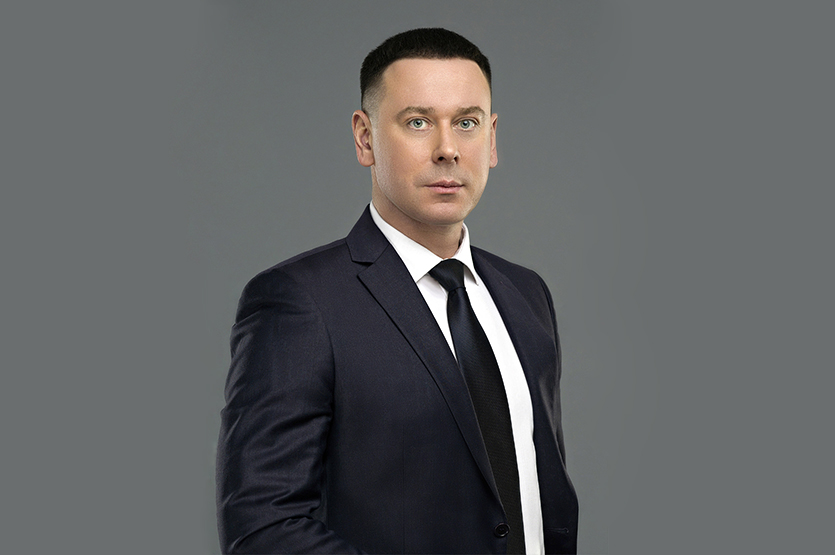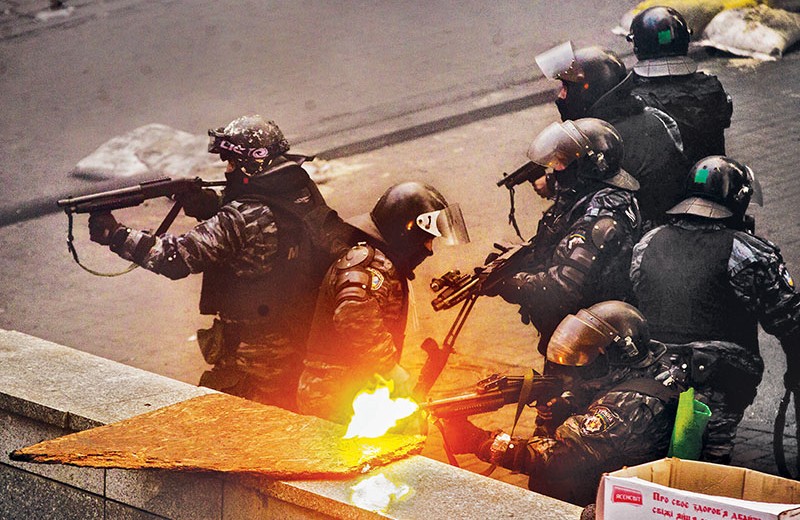Oleksandr Buryak, a controversial former prosecutor, was appointed on Jan. 2 as the top investigator at the State Investigation Bureau in charge of cases into the 2013–2014 EuroMaidan Revolution. The cases include those into the murder of about 100 protesters.
The appointment, however, has been deemed controversial and fueled concerns that the EuroMaidan investigations may collapse.
Neither the State Investigation Bureau nor Buryak responded to requests for comment.
Buryak, a former deputy of ex-State Investigation Bureau Chief Roman Truba, was appointed to the bureau in a selection process that civic activists claim was rigged in 2017. Buryak also features in a criminal investigation against Ukraine’s top judges.
The lawyers and families of EuroMaidan demonstrators urged State Investigation Bureau Chief Iryna Venedyktova to cancel Buryak’s appointment and hold a transparent competition for the job.
“The appointment was made in the most closed and non-transparent way,” they said in a statement. “(Buryak’s background) makes constructive cooperation between the victims and the EuroMaidan unit’s leadership impossible and will have a very negative impact on society’s trust in EuroMaidan investigations. Without this, effective investigations and the restoration of justice are impossible.”
Dubious background
Buryak was a prosecutor in 1998–2017. In the first half of 2014 Buryak was the top investigator at the Kyiv prosecutor’s office, and EuroMaidan cases under his supervision made no progress whatsoever during that time, Yevhenia Zakrevska, a lawyer for EuroMaidan protesters, told the Kyiv Post.
In 2017 Buryak was appointed as a deputy of Truba as a result of a controversial competition.
Oleksandr Lemenov, an anti-corruption activist and a former member of a hiring committee at the State Investigation Bureau, argues that the 2017 competition for top bureau jobs was rigged in favor of government loyalists. Lemenov and other activists say that the committee that chose Truba and Buryak was dominated by politicians and ignored civil society’s opinion.
Moreover, when Buryak was appointed, he was seen as a protege of ex-President Petro Poroshenko, Lemenov added.
The authorities have denied these accusations.
Vitaly Tytych, a lawyer for EuroMaidan protesters, and Sergii Gorbatuk, an ex-top investigator for EuroMaidan cases, have filed lawsuits to cancel the appointments of both Truba and Buryak, arguing that they violated numerous laws.
Truba eventually left the job: In December, the Ukrainian parliament passed a law to fire him and hold a new competition for his job, following an alleged leak from the bureau that implicates him in unlawful interference in cases, the accusations that Truba denies.
Venedyktova, a former lawmaker from President Volodymyr Zelensky’s Servant of the People party, was appointed as the bureau’s acting chief. Buryak, in turn, stayed at the bureau.

Oleksandr Buryak, a controversial former prosecutor, was appointed on Jan. 2 as the top investigator at the State Investigation Bureau in charge of cases into the 2013–2014 EuroMaidan Revolution. (dbr.gov.ua)
Vovk recordings
Buryak is one of those who feature in alleged audio recordings implicating judges of the Kyiv Administrative District Court, including its former head Pavlo Vovk, in various wrongdoings. The recordings were released in July, and the judges were charged in August with obstructing justice and issuing unlawful rulings.
In the recordings, persons alleged to be Buryak and Vovk discussed interfering in a State Investigation Bureau commission’s decision not to hire Yevheny Ablov, a judge of Vovk’s court, as a State Investigation Bureau official. Specifically, they discuss influencing the Kyiv Administrative District Court judge who was considering canceling the decision and threatening the judge with a criminal case if he does not agree.
Vovk said that Truba’s deputies Buryak and Olga Varchenko also supported hiring Ablov.
“I reached an agreement with the State Investigation Bureau’s leadership,” the person alleged to be Vovk said in the recordings. “I’m friends with two deputy chiefs of the bureau. The (State Investigation Bureau) commission is controlled by people of (Interior Minister Arsen) Avakov. I reached an agreement with Avakov. So tell him to issue a ruling, and it won’t be appealed.”
Interior Ministry spokesman Artem Shevchenko declined to comment.
“You don’t have objections to (Ablov) getting this job?” Vovk told the person alleged to be Buryak. “Can you consult with Olga (Varchenko)?”
Zakrevska lambasted Buryak’s appointment on Facebook, saying that it constituted a conflict of interest since Ablov is under investigation for allegedly issuing unlawful rulings against EuroMaidan demonstrators.
The investigation into the Kyiv Administrative District Court stalled in November when prosecutors missed the deadline for sending it to trial. Tytych and other critics believe that prosecutors and courts have effectively buried the case, which they deny.
Collapse of EuroMaidan cases?
Buryak’s appointment follows several other moves that the lawyers and families of some EuroMaidan protesters interpret as the collapse of the EuroMaidan investigations.
A major blow to the EuroMaidan cases was dealt on Dec. 28, when a court released from custody five ex-police officers who were on trial for allegedly murdering EuroMaidan protesters but had not been convicted yet. The release was part of a prisoner exchange with Russia and its proxies waging war in the Donbas.
However, lawyers for EuroMaidan protesters argued that the release was blatantly unlawful, and the exchange of them was impossible under the law since they were suspects, not prisoners of war. Vitaly Tytych, one of the lawyers, said that the release of the officers was meant to prevent investigators from identifying Russia’s role in the alleged murders, for Moscow denies any involvement in the killings.
President Volodymyr Zelensky has denied such accusations, saying that the investigations into the murders would continue in absentia. Gorbatuk, however, has previously stated that imperfect Ukrainian law makes it impossible to lawfully convict suspects in absentia.
In October, Prosecutor General Ruslan Riaboshapka fired Gorbatuk, who had been consistently praised by the lawyers and families of EuroMaidan protesters. They argued that Gorbatuk’s firing would contribute to the collapse of the cases.
In the same month, the lawyers and families of EuroMaidan demonstrators criticized the appointment of Viktor Mysyak as the main prosecutor overseeing State Investigation Bureau investigators in EuroMaidan cases. They accused Mysyak, who will work jointly with Buryak, of having sabotaged EuroMaidan investigations before, which Mysyak himself denies.
In November, EuroMaidan cases were transferred from the Prosecutor General’s Office to the State Investigation Bureau and were effectively suspended as a result. To protest against the suspension of the cases, lawyer Zakrevska went on a hunger strike.
Riaboshapka has denied the accusations of intentionally blocking EuroMaidan cases, saying they would continue.



